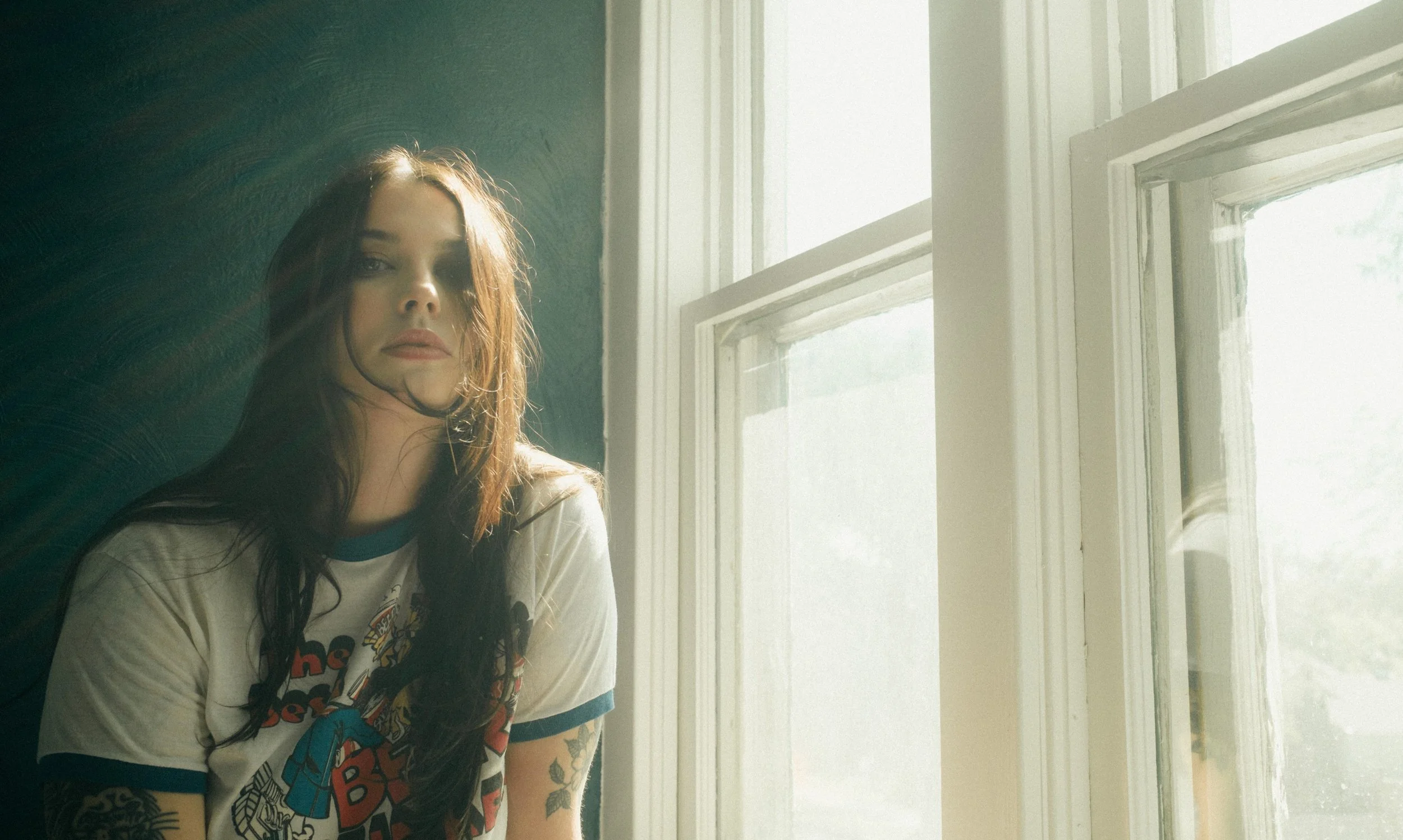Click Image to Download!
In the winter of 2021, Lauren Gillis had found herself in a place where she finally felt good about her mental and physical health. The singer-songwriter, who performs under the moniker Lucette, had been on a mental health journey since her late teens. Even a year into a global pandemic, when seemingly everyone was flailing and faltering, she felt as if the work she had done to grow over the years had paid off. Then, three months shy of her 30th birthday, she suffered a life-changing injury, and her outlook suddenly changed. “It just interrupted everything,” she says. “I was in so much pain and stripped of my independence. I couldn’t drive, I couldn’t do anything, and I wasn’t working.” There she was, back in a familiar dark mood.
Before her accident, Lucette had taken time to hone her craft, dialing in, with great focus and care, on her artistic growth toward the kind of music she felt compelled to create. Now, in a state of arrested autonomy, every darker feeling she had been writing about was magnified; self-loathing, insecurity, and anger crowded the lens. She looked at the batch of songs she had recently recorded and realized, save for one, they didn’t quite resonate with where she was at anymore. Enter producer Soren Hansen (New Politics, Elle King, Sam Palladio). After hitting it off with Lucette while recording, Hansen reached out to her with a proposition: What if they tried writing together? The pair began collaborating over Zoom in January 2024, writing songs that weren’t rooted in fictional characters and stories but instead in “exactly how I was feeling in the moment, in a more vulnerable state.” By May, they had five tracks they wanted to record.
What resulted from these sessions was Nice Girl From the Suburbs, out March 21, an intimately personal six-song EP that ambitiously expands Lucette’s musical repertoire. Working with Hansen, who became a close friend, Lucette found herself in a collaborative environment where she was provided with the opportunity to not only open herself up to deeper, more autobiographical songwriting, but the chance to take the reins of her musical direction herself. “Everyone was down to try new things and really find the sound that I was looking for,” she says. Sonically inspired by ‘90s dream pop and alt rock, Nice Girl From the Suburbs pairs Lucette’s deeply introspective lyrics with lush and anthemic production, recalling strains of Fiona Apple and Sheryl Crow by way of Pixies, Portishead, and Mazzy Star.
“These songs are both recognizing that dark place and recognizing that I didn’t really help myself to get out of that dark place,” Lucette says. It’s a liminal space to which many can relate, one that doesn’t always take a drastic injury or accident to experience. Spend any amount of time scrolling these days and you’re bound to hit a meme or two about overthinking and overdramatizing, spiraling and self-loathing; the general consensus, it seems, is that more people are moving through the world with their brain with a hum of dread than without.
Across the EP’s tracks, Lucette depicts this push and pull, resisting maudlin inclinations or “sad girl” stereotypes, deftly mixing self-pity with clever self-deprecation. Even the title itself—Nice Girl From the Suburbs, an accurate, though comically over-simplified, description of Lucette herself—is in on the joke, a raised eyebrow daring to ask why am I like this when, on paper, I have it pretty good? “I’m being real with myself. I don’t feel like a victim of anyone else’s stuff. I’m a victim to my own brain,” she says. “It’s recognizing that I am my own worst enemy, but also that I think it’s okay. It’s kind of human to be your own worst enemy.”
Nice Girl From the Suburbs brims with this kind of self-awareness and sense of a shared humanity. Situations may feel bleak and pointless (“Wasted Monday”), chances may seem missed or undeserved (“Rodeo Clown”), bad behaviors may seem impossible to shake (“Back in the Blue”), and outlooks catastrophic (“Heading For The End”). But the wry observer in Lucette remains a constant through all, turning her sharply intuitive eye onto herself. When she sings a line like “everytime it hurts, I’m heading for the end” on the down-tempo “Heading For The End,” she lives in the complexity of being a person: the very real and literal-feeling of pain, and the observer chiding her tendency to catastrophize with a slight roll of her eyes, though not without a touch of empathy.
A native of Alberta, Canada, Lucette’s 2014 debut, Black is the Color, produced by Dave Cobb, sparked widespread praise and intrigue for her “clean voice with pop vibrato…set firmly in roots music” (NPR Music) which showcased “her singular vision, confident yet haunting vocals, and the distinct ability to tell stories that resonate” (Diffuser). Her 2019 follow-up, Deluxe Hotel Room, produced by Sturgill Simpson (with whom she toured Black is the Color), further established her as a unique rising star. The album was heralded for “reveal[ing] the depth and scope of her songwriting” (Chicago Sun Times) in “a bold expansion of Lucette’s melodic sensibilities with arrangements that avoid the rootsy cliches of Americana music” (Rolling Stone) that served as “a textbook case of substance over style” (PopMatters) and “a master class in mood sustainability” (No Depression).
On Nice Girl from the Suburbs, Lucette boldly continues her journey of self-discovery as an artist. While Americana remains an influence, Nice Girl From the Suburbs reflects her growth over the past decade, and the expanding musical inclinations she first began to explore on Deluxe Hotel Room. “I listen to so many artists and I pull a lot of inspiration from different things,” she says. “I think Nice Girl From the Suburbs especially speaks to the ‘90s kid in me—pulling from that pop and alternative music with these massive choruses. It felt like the right space for me to exist in my current point of my life, like an amalgamation of everything I’ve done up to this point while also a launchpad for the next thing.”
Nice Girl From the Suburbs is just that: a lively, though cliche-resisting, nod to past eras of music with one eye fixed on the future, wholly present and relevant for current anxiety-inducing times. Songs sonically traverse the spectrum of human emotion; “Too Soon For Sorrys” begins as if a slow, stark yearning love song before gradually building to a frenzy of searing, fuzzed out guitar wails. “Back in the Blue,” featuring Mariel Buckley and produced by Matt Pence and Nik Lee, crafts a relapse into self-defeating apathy as a pedal-steel-filled boot-stomper filtered through a shaggy, slacker-pop lens. “I’m fucked up, but so what? That’s not anything new,” Lucette sings with a shrug. Meanwhile, “Wasted Monday” pairs Lucette’s haunting, Southern gothic vocals with lush, anthemic dream pop synths.
The thing about dark places is that there’s no manhole cover on top of them keeping us in there forever; light still shines above us, especially if we have the right people by our sides. “Letting all my doubts get lost in this feeling, I’m just lucky to get lucky with you,” Lucette sings on “True Devotion,” an upbeat glimmer of hope and joy. Lucette has climbed out of the dark space and is on the path forward, in the driver's seat and in full command. The good news is, if you’re not there yet, there’s always this EP to keep your misery a little company until you arrive.









